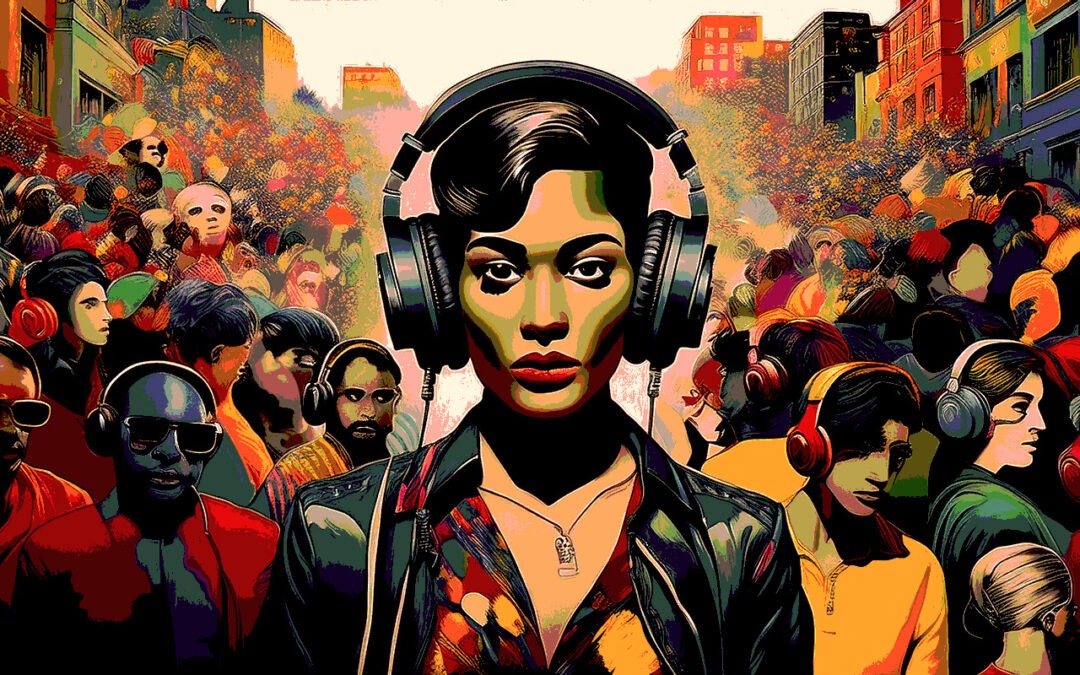By the Zonagirante.com team @spinning zone
Cover art by Zonagirante Studio
Cultural discontent
For a long time, the idea has been repeated that today's musicians live enclosed in bubbles of indifference, more concerned with streaming platform algorithms than with the social, political, and industrial conflicts shaking their communities. For a long time, the idea has been repeated that musicians on the move and protests They were the odd ones out on the walk.
However, recent years have shown the opposite: artists and collectives have taken to the streets, organized themselves into guilds, challenged governments, and raised their voices against technology giants. Music, more than just entertainment, remains a powerful tool for mobilization.
United Kingdom: Austerity and musicians in resistance
One of the most visible cases occurred in the United Kingdom in 2023, when a broad front of artists — from established stars to emerging bands — protested against the austerity policies that were hitting the cultural sector. Cuts to public funding for the arts and precarious working conditions prompted the organization of groups demanding decent treatment.
For many, it was a reminder that music cannot be separated from the material conditions that allow its existence.
Silent protest against artificial intelligence
This year, another gesture caught global attention: more than a thousand British artists, including Kate Bush and Annie Lennox, released an album of complete silence titled Is This What We Want? as a protest against the use of their works in artificial intelligence training without consent.
The project, available on digital platforms, did not seek to entertain but to unsettle: each silent track functioned as a metaphor for the void that music would leave if creators lose control over their rights.
It was an ingenious and disruptive way of denouncing how poorly regulated technology can threaten the very existence of musicians.
A different, but equally powerful, echo was heard in Nigeria in 2020 with the movement #EndSARS. There, musicians like Burna Boy, Davido and Falz played a key role in the international denunciation of police violence.
It wasn't just about singing about injustice, but about actively participating in protests, donating resources, and using their influence to pressure international organizations. The Nigerian music scene, one of the most vibrant on the continent, demonstrated that the voice of artists continues to carry undeniable political weight.
Chile: music in the street and the constitutional process
In Chile, since the social uprising of 2019, dozens of musicians became protagonists of a wave of demonstrations that questioned the economic and political model inherited from the dictatorship.
What's interesting is that it wasn't just the singer-songwriters with a protest tradition who joined in: trap, pop and electronic bands also participated in street concerts, interventions in squares and in support of the constituent process.
Music, far from dividing, became a common thread between different generations.
In Argentina, artists and cultural institutions also raised their voices. In February 2025, Milo J protested on social media after the cancellation of a free concert at an emblematic memorial site (the former ESMA), a gesture laden with political symbolism.
Furthermore, the cultural sector withstood cuts to INCAA and other spaces, with international support.
Artistic collectives responded with independent projects: crowdfunded films, underground concerts, and murals that preserve memory. They also played a leading role in marches defending public universities and culture as a right.
Europe and the fight for fair royalties
The technological issue, in fact, is one of the most global drivers of mobilization today. In Germany and France, powerful musicians' unions have demanded a fairer redistribution of royalties from platforms such as Spotify, Deezer, and YouTube.
These struggles, although technical in appearance, have an enormous social impact: the sustainability of thousands of independent artists depends on them being recognized as receiving a fair wage for their work.
The dispute between music and the digital industry is just beginning and promises to shape the cultural agenda for the coming years.
United States: Guilds and the Creative Future
In the United States, meanwhile, musicians have revived union debates surrounding labor rights, especially in contexts such as the Hollywood writers' and actors' strike in 2023.
Although less visible in the media, the American Musicians Guild (AFM) has pushed to include the voice of performers and composers in these discussions about the future of creative work.
New artificial intelligence technologies and automation are perceived as concrete threats that could further precariousize the sector.
All these examples, although different in form and context, share the same root: the awareness that musicians are not separate from the world around them.
Every time an artist organizes, protests, or challenges political and economic powers, It demonstrates that music has not lost its ability to mobilize emotions and, with them, bodies and collective wills.
Contrary to the idea that we live in an age of apathy, these experiences remind us that music is also a language of resistance.
Perhaps today's challenge is not to invent new protest songs in the classic style, but to find creative and effective ways to articulate the struggles of the present.
Musicians, with their visibility and their power to attract people, are destined to continue being a force that unsettles, inspires, and transforms.
History didn't stop with the anthems of the 20th century: it continues to be written, in the streets and on stages, with guitars, beats, and voices that refuse to be silenced. These examples show that musicians on the move and protests They remain a force for cultural transformation.





